Blog Content
20
Jul
2025
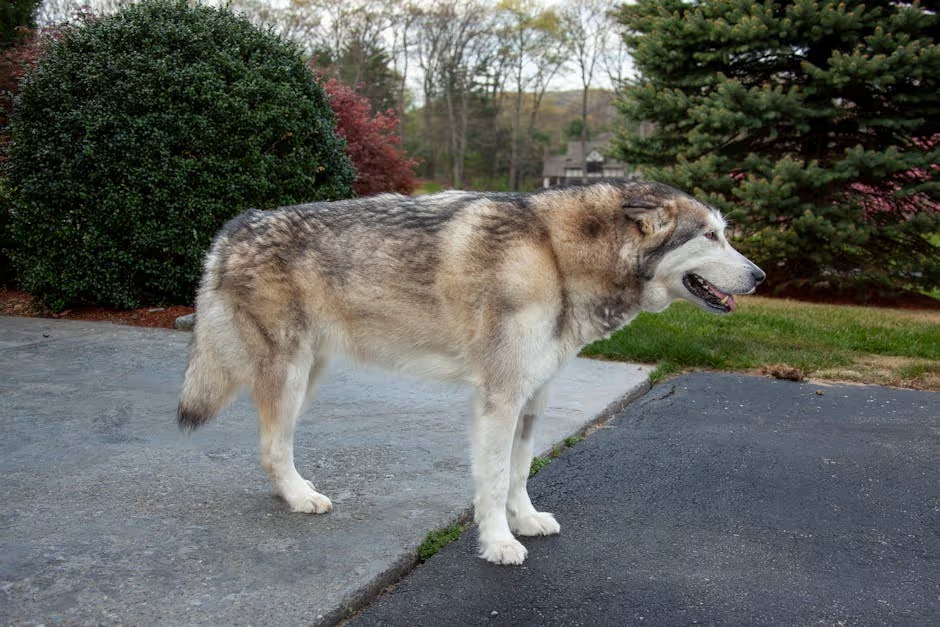
The massachusetts homeowners insurance dog list isn't an official state document - it's a collection of breed restrictions that vary by insurance company and can make or break your ability to get coverage. Here's what Massachusetts dog owners need to know:
Most Commonly Restricted Breeds:
What This Means for You:
If you're a dog owner in Newton, Wellesley, Brookline, Needham, Belmont, or Natick, this issue hits close to home. Nearly 85 million dogs live in U.S. households, but about 4.5 million people - mostly children - are bitten or injured by dogs each year. This stark reality drives insurance companies to be cautious about certain breeds.
The financial stakes are real. In 2021, insurance companies paid out $881 million in dog bite claims, with the average claim costing $49,025. For Massachusetts homeowners, this translates to careful underwriting decisions that can impact your ability to protect your most valuable asset - your home.
Unlike some states that have banned breed-specific insurance discrimination, Massachusetts allows insurers to make coverage decisions based on dog breeds. This means homeowners across the Commonwealth face a complex landscape when trying to secure coverage with certain four-legged family members.
We have helped countless Massachusetts families steer the massachusetts homeowners insurance dog list challenges over the past decade. Kovalev Insurance Agency in Newton, MA understand that finding the right coverage for dog owners requires expertise in both insurance underwriting and local market conditions.
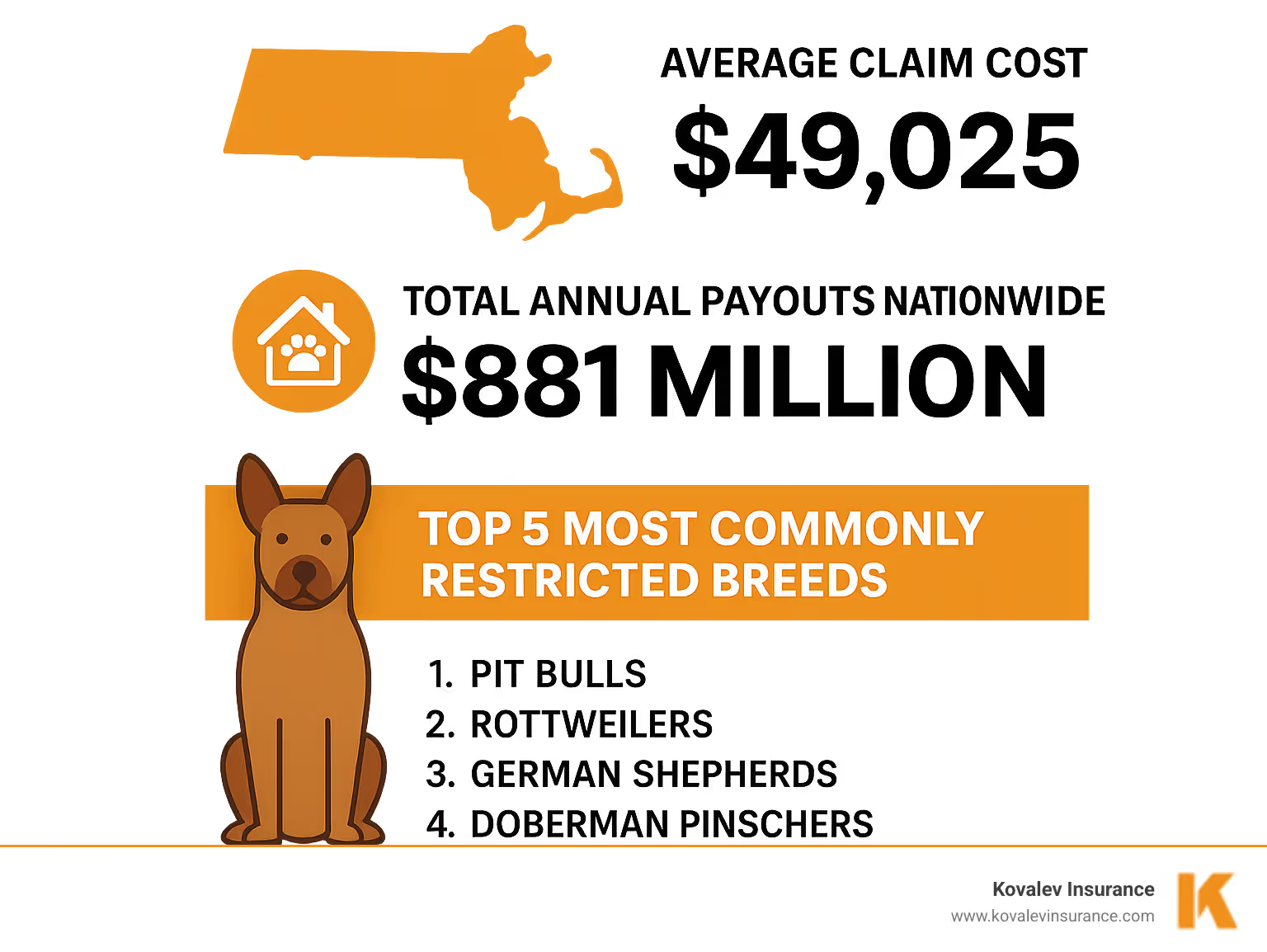
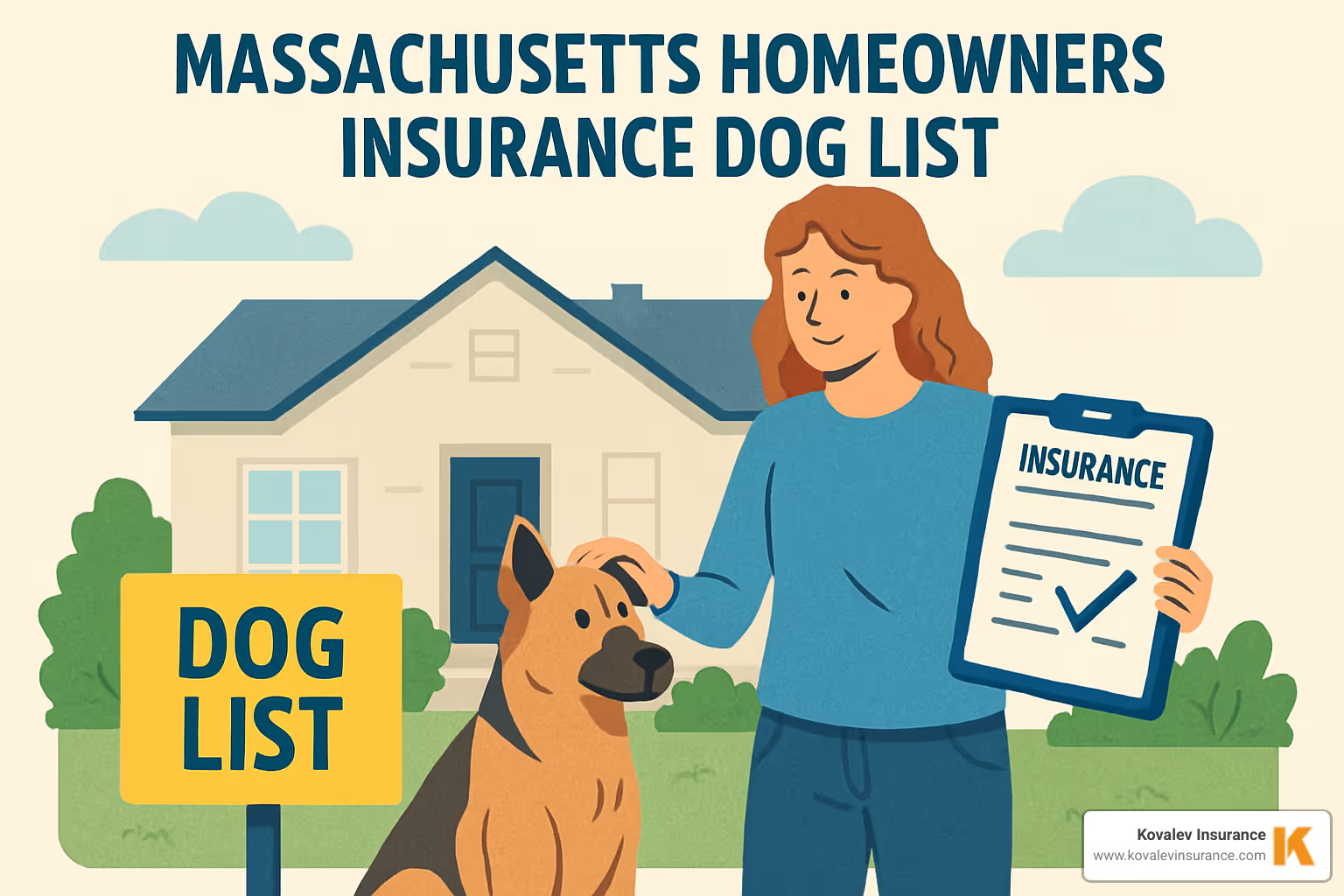
When I sit down with families in Newton or Wellesley who are looking for homeowners insurance, one of the first questions I ask is: "Do you have any pets?" It's not because I'm a dog lover (though I am!) - it's because your furry family member can dramatically impact your insurance options and costs.
The truth is, insurance companies don't create the massachusetts homeowners insurance dog list restrictions to be mean. They're looking at hard data that shows some uncomfortable realities about pet-related claims. According to the Insurance Information Institute, dog bites are the most common homeowners insurance claim relating to pets, with more than 17,000 dog bite claims filed each year nationwide.
Your homeowners policy includes something called personal liability coverage - this is what protects you financially when your dog causes injury to someone else. When we help clients understand their Massachusetts Home Insurance Terms, we explain that this coverage typically ranges from $100,000 to $500,000. But as you'll see, that might not be enough for serious incidents.
Insurance companies view certain breeds as statistically more likely to cause expensive claims. This doesn't mean your individual German Shepherd or Rottweiler is aggressive - it's about actuarial data and risk management. Insurance is fundamentally about pooling risk, and when certain breeds appear more frequently in expensive claims, insurers adjust their underwriting accordingly.
The numbers behind dog-related insurance claims are eye-opening. The American Veterinary Medical Association (AVMA) reports that while nearly 85 million dogs live in U.S. households, about 4.5 million people - mostly children - are bitten or injured by dogs each year. In 2021 alone, insurance companies paid out $881 million for dog bite and dog-related injury liability claims.
Even more concerning? The average claim cost reached $49,025 in 2021. These costs have been rising steadily - between 2014 and 2023, the cost of claims related to dog bites surged by 82.5%. This dramatic increase affects how insurers price policies and evaluate risk, which directly impacts your ability to secure coverage and the premiums you'll pay.
When we help clients with Mass Home Insurance Cost Insights, we often see how dog ownership - particularly of certain breeds - can significantly impact their insurance options and costs. The financial exposure goes beyond just immediate medical costs.
A single dog bite claim can include emergency room visits and medical treatment, ongoing medical care and rehabilitation, lost wages for the victim, pain and suffering damages, legal fees and court costs, and even potential punitive damages. We've seen cases where settlements reached $450,000 or more, which explains why insurers are so cautious about certain breeds and why adequate liability coverage is crucial for Massachusetts homeowners.
Here's where Massachusetts gets interesting. Unlike some states that have banned breed-specific insurance discrimination, Massachusetts gives insurers significant freedom in their underwriting decisions. Under M.G.L. Ch. 175, insurance companies are not required to write or renew policies, and they can make coverage decisions based on various risk factors - including dog breeds.
This creates a unique situation. While Massachusetts state law prohibits cities and towns from banning specific dog breeds, insurance companies operate under different regulations. Your Pit Bull might be perfectly legal in Brookline or Needham, but finding homeowners insurance could still be challenging.
The MSPCA-Angell argues that breed-specific policies unfairly target responsible dog owners who properly train and socialize their pets. However, the current legal framework in Massachusetts allows insurers to continue these practices.
For homeowners in our service areas - Newton, Wellesley, Brookline, Needham, Belmont, and Natick - this means navigating a complex insurance landscape where your dog's breed can significantly impact your coverage options, even if your community welcomes all breeds. The key is understanding that there's no state-level ban on breed restrictions, which means each insurance company can create their own policies about which breeds they'll cover.
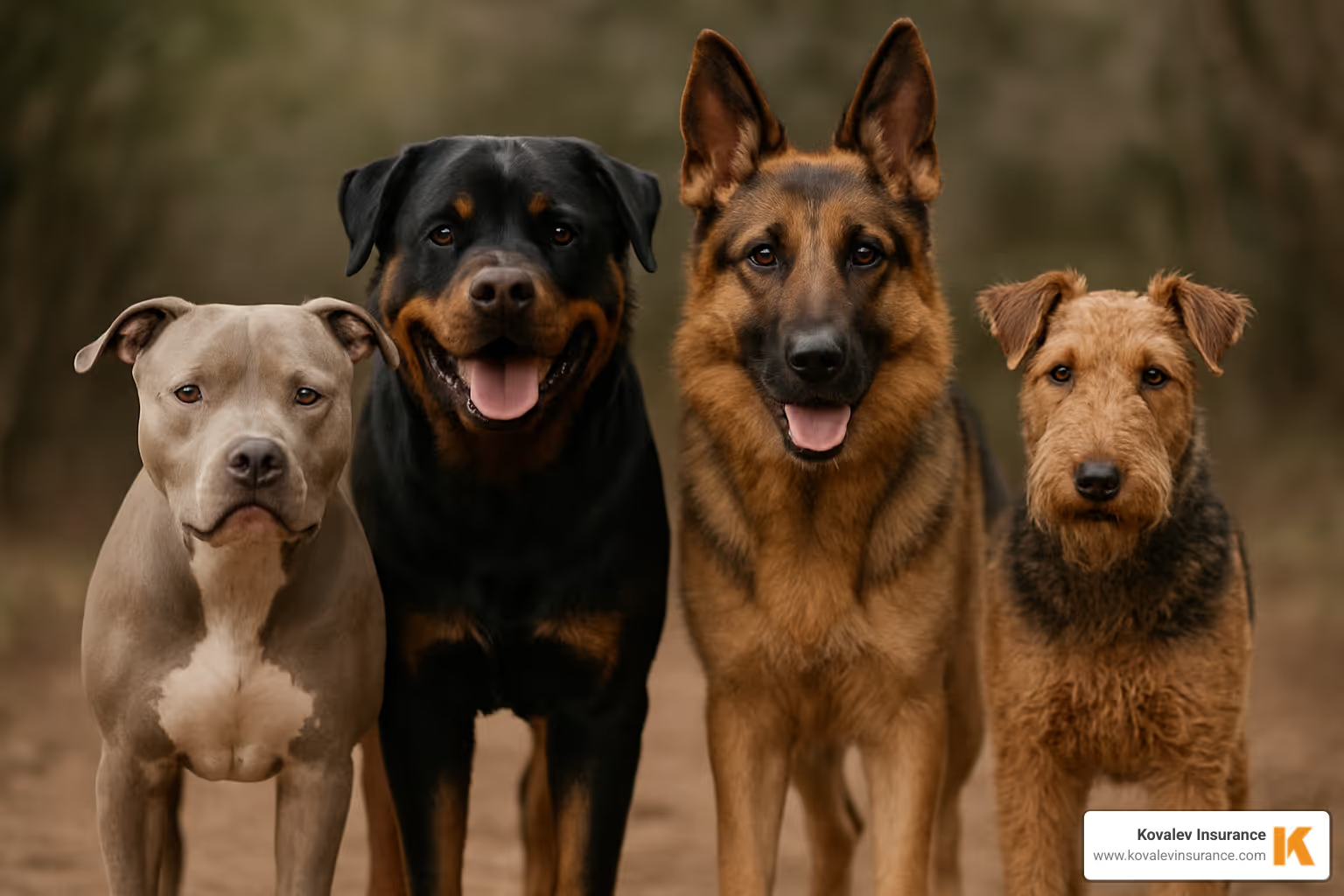
Here's something that surprises many Massachusetts homeowners: there's no official massachusetts homeowners insurance dog list handed down by state regulators. Instead, each insurance company creates its own restrictions based on their claims experience and risk models.
This company-by-company approach creates both challenges and opportunities for dog owners in Natick, Belmont, and throughout Greater Boston. What one insurer considers a deal-breaker, another might welcome with open arms. That's exactly why working with an independent agent becomes so valuable - we can shop multiple carriers to find the right fit for you and your four-legged family member.
Over the years, our team has helped countless clients steer these restrictions. Our experience with Any MA Home Insurance Pit Bull Dogs has taught us that persistence and the right approach often lead to coverage solutions, even for traditionally challenging breeds.
While every insurance company has its own approach, certain breeds appear on restricted lists more frequently than others. Through our work with multiple carriers across Massachusetts, we've seen clear patterns emerge.
Pit Bulls top nearly every restricted list. This includes American Pit Bull Terriers, American Staffordshire Terriers, and Staffordshire Bull Terriers. Rottweilers and German Shepherds also face frequent restrictions, despite their popularity as family pets and working dogs.
Doberman Pinschers often join this group, along with Akitas and Chow Chows. These breeds face restrictions primarily due to their size, strength, and historical claims data.
Some insurers cast an even wider net, including Wolf-hybrids, Presa Canarios, Mastiffs (including Bull Mastiffs), and American Bulldogs. We've also seen restrictions on Great Danes, Siberian Huskies, and Alaskan Malamutes.
The reasoning behind these restrictions typically involves factors like bite force potential, size and strength, historical claims experience, and perceived aggression levels. Some insurers also consider exercise and socialization requirements when evaluating breeds.
What gives us hope is that more insurers are moving toward individual dog evaluation rather than blanket breed restrictions. This case-by-case approach can be much more favorable for responsible dog owners, regardless of their pet's breed.
When your beloved companion's breed appears on an insurer's restricted list, you'll typically face one of four scenarios - and none of them are fun to steer alone.
Policy denial is the most straightforward but challenging outcome. The insurer simply refuses to write a policy if you own a restricted breed. This can feel frustrating, especially when you know your dog is gentle and well-trained.
Non-renewal often catches homeowners off guard. Maybe you acquired a restricted breed after getting your policy, or perhaps your insurer changed their underwriting guidelines. Either way, Massachusetts law requires insurers to provide 45 days' notice for non-renewal - not much time to find new coverage.
Higher premiums represent a middle-ground approach. Some insurers will provide coverage but charge additional premiums or surcharges for homes with certain dog breeds. While this increases your costs, it keeps your coverage intact.
Liability exclusion endorsements are perhaps the most common solution insurers offer. They'll provide your homeowners coverage but exclude liability claims related to your dog. This means you'd be personally responsible for any dog-related injuries or property damage - a potentially expensive situation.
The challenge of finding coverage has led many Massachusetts homeowners to seek help from independent agents who can steer multiple insurance companies. Our team regularly helps clients find solutions through our Home Insurance Quotes Massachusetts service, often finding options that seemed impossible at first glance.

If you own a breed that's commonly on the massachusetts homeowners insurance dog list, don't lose hope. Yes, it's more challenging, but it's absolutely not impossible. I've helped countless families in Newton, Wellesley, and throughout Greater Boston find coverage for their beloved pets - even those breeds that make insurance companies nervous.
The key is being proactive and working with someone who understands the market. Many insurers are moving away from blanket breed bans toward evaluating each dog individually. This shift toward case-by-case evaluation is good news for responsible dog owners who've invested time in proper training and socialization.
Think of it this way: insurance companies want to write policies and earn premiums. They just need to feel confident that you're a responsible pet owner who's taken steps to minimize risk. When you can demonstrate that commitment, doors start opening.
The best weapon against breed discrimination is documentation that shows your dog is well-trained and well-behaved. The Canine Good Citizen program from the American Kennel Club is like a golden ticket - some insurers will make exceptions for restricted breeds that have earned this certification.
The AKC Canine Good Citizen certificate tests your dog on basic obedience and good manners. It's not just a piece of paper - it's proof that your dog can sit, stay, come when called, and behave appropriately around strangers and other dogs. Insurance underwriters understand what this certification means.
Obedience training certificates from professional programs also carry weight. Whether it's basic puppy classes or advanced training, these documents show you've invested in your dog's education. We've seen clients in Brookline and Needham successfully argue their case using graduation certificates from local training facilities.
Spay and neuter records might seem unrelated to insurance, but they're actually quite important. Altered dogs are statistically less likely to bite, and many insurers view this favorably. It's a simple step that demonstrates responsible ownership.
Current veterinary records tell a story about your commitment to your pet's health and well-being. Up-to-date vaccinations, regular check-ups, and documented health history all paint a picture of a responsible owner.
If your dog is trained as a service animal, this often overrides breed restrictions entirely. The Americans with Disabilities Act provides strong protections for service animals, and most insurers recognize this.
Beyond formal certifications, consider gathering letters from neighbors attesting to your dog's good behavior, photos showing proper containment like fenced yards, and evidence of ongoing socialization activities. Some insurers even require a "meet and greet" with your dog as part of the underwriting process.
Getting that denial letter in the mail feels terrible, but it's not the end of the road. Different insurers have completely different breed restrictions and underwriting guidelines. What one company won't touch, another might welcome with open arms.
Shopping around is crucial, but doing it effectively requires knowing which companies are more flexible with dog breeds. This is where working with an independent agent becomes invaluable - we can quickly assess multiple carriers and find the best fit without you having to make dozens of phone calls.
If you're facing limited options, consider accepting a dog liability exclusion endorsement. This means the insurer will provide coverage for your home but exclude liability claims related to your dog. It's not ideal, but it allows you to maintain homeowners coverage for everything else while you continue searching for better options.
When you do find coverage, seriously consider increasing your personal liability coverage significantly. Standard policies typically offer $100,000 to $300,000 in liability coverage, but dog-related claims can easily exceed these amounts. Our Personal Umbrella Insurance Massachusetts options provide additional protection that could save you financially if the worst happens.
The Massachusetts FAIR Plan exists as a last resort for those who cannot obtain insurance through the standard market. While it offers limited coverage and isn't ideal, it ensures you can meet mortgage requirements and have basic protection for your home.
At Kovalev Insurance, we've developed relationships with multiple carriers over the years and understand which companies are more flexible with dog breeds. We often find solutions that individual homeowners might not find on their own - it's about knowing which doors to knock on and how to present your case effectively.
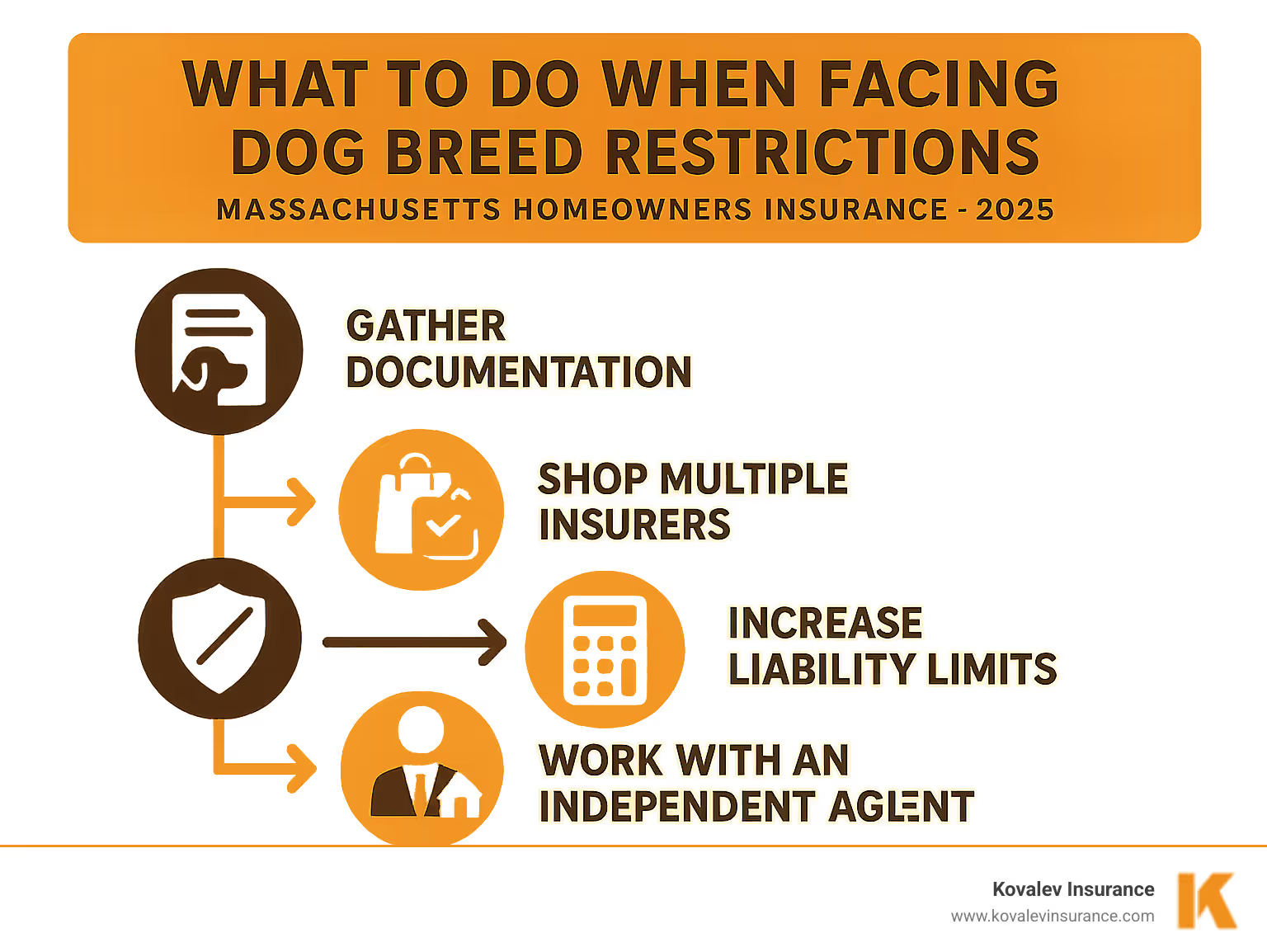
The impact on your premiums really depends on your furry friend's breed and your insurance company's policies. If you're a Golden Retriever or Labrador owner in Newton or Wellesley, you'll likely see no impact at all on your homeowners insurance costs. These breeds are widely accepted and don't raise red flags with insurers.
However, if your dog's breed appears on the massachusetts homeowners insurance dog list, you might face some financial challenges. We've seen moderate surcharges of 10-25% for breeds considered moderate risk, while high-risk breeds can trigger surcharges of 25-50% or more. In some cases, certain carriers won't offer coverage at all.
The good news? Many insurers offer discounts for responsible ownership. Completing obedience training programs, installing proper fencing, maintaining current vaccinations, and spaying or neutering your pet can all work in your favor. Some of our clients in Brookline and Needham have actually saved money by demonstrating their commitment to responsible pet ownership.
For more detailed information about insurance costs across the Commonwealth, check out our guide on Average Homeowners Insurance Mass.
Unfortunately, yes - Massachusetts insurers can choose not to renew your policy because of your dog, though they must provide 45 days' notice before non-renewal. This isn't something they do lightly, but it does happen.
Breed-related non-renewal is the most common scenario we see. Maybe you adopted a Pit Bull after your policy was already in place, or your insurer changed their underwriting guidelines and your German Shepherd is now on their restricted list. Sometimes insurers find a previously undisclosed dog during a claim or inspection.
Behavior-related issues can also trigger non-renewal. If your dog has bitten someone, generated multiple noise complaints, or caused damage to others' property, your insurer might decide the risk is too high to continue coverage.
The most serious situation involves material misrepresentation - failing to disclose your dog when applying for coverage or providing false information about your dog's breed or history. This can lead to immediate policy cancellation and potential claim denials.
Here's my advice: always be upfront with your insurer about any pets in your household, even if they don't specifically ask. Transparency protects you from potential complications down the road and helps us find the right coverage for your situation.
Pet liability coverage isn't a separate policy - it's typically part of your homeowners insurance personal liability protection. Think of it as your financial safety net when your four-legged family member causes problems for others.
Your coverage responds when your dog bites or injures a visitor, damages someone else's property, or when you're sued due to a dog-related incident. This includes medical expenses, legal fees, court judgments, and settlements. The coverage even applies when incidents happen away from home - if your dog bites someone at the park in Belmont or damages a neighbor's fence in Natick, you're still protected.
What's not covered includes injuries to you or your family members, damage to your own property, veterinary bills for your dog, and incidents involving excluded breeds if you have a breed exclusion endorsement.
Standard coverage limits typically range from $100,000 to $500,000 in personal liability coverage. However, with the average dog bite claim costing $49,025 and some settlements reaching $450,000 or more, many dog owners benefit from higher liability limits. This is where our Personal Umbrella Insurance Massachusetts options become valuable - they provide additional protection beyond your homeowners policy limits.
The reality is that even the friendliest dog can have a bad day, and the financial consequences can be significant. Having proper liability coverage gives you peace of mind to enjoy life with your pet without constantly worrying about worst-case scenarios.
Finding the right homeowners insurance when you own a dog in Massachusetts might feel like solving a puzzle, but it's absolutely achievable with the right approach and guidance. The massachusetts homeowners insurance dog list challenges we've explored throughout this guide are real, but they're not impossible barriers for responsible pet owners.
Think of it this way: every day, thousands of Massachusetts families successfully maintain both their beloved pets and comprehensive homeowners coverage. The secret isn't magic - it's understanding how the system works and knowing where to find the right solutions.
Your dog is family, and at Kovalev Insurance, we get that. We've spent over a decade helping pet owners throughout Newton, Wellesley, Brookline, Needham, Belmont, Natick, and Greater Boston steer these exact challenges. What we've learned is that there's almost always a path forward - it just takes patience, preparation, and the right insurance partner.
The most successful outcomes happen when homeowners are proactive rather than reactive. Don't wait until you're facing a policy cancellation or denial to start exploring your options. Whether you're considering adding a four-legged family member or you're already a proud dog parent, understanding your insurance landscape early gives you more choices and better outcomes.
Responsible ownership makes all the difference. The insurance industry is slowly recognizing what dog lovers have always known - that individual dogs can't be judged solely by their breed. Training certificates, veterinary records, and proper socialization demonstrate the kind of responsible ownership that insurers increasingly value.
Transparency protects you. Always disclose your pets to your insurance company, even if they don't specifically ask. This honest approach prevents claim denials and policy cancellations down the road. It also allows your agent to find the best possible coverage for your specific situation.
Our experience working with clients across Greater Boston has taught us that the insurance market is more flexible than many people realize. Different carriers have different appetites for risk, different breed restrictions, and different approaches to underwriting. This variety works in your favor when you have an independent agent who knows how to steer these differences.
The investment in proper coverage pays off. When you consider that the average dog bite claim costs nearly $50,000, and some settlements reach $450,000 or more, adequate liability coverage isn't just smart - it's essential. Whether that means increasing your standard limits or adding umbrella coverage, protecting your financial future is worth the investment.
We're proud to be part of the solution for Massachusetts pet owners. Our relationships with multiple insurance carriers, combined with our deep understanding of local market conditions, allow us to find creative solutions that work for both you and your furry family members.
Your next step is simple: reach out to our team to explore your options. We'll review your specific situation, discuss your coverage needs, and work together to find the right protection for your home and your pet. Don't let breed restrictions keep you from the peace of mind you deserve.
Ready to find why so many Massachusetts pet owners trust Kovalev Insurance for their homeowners coverage needs? Visit our guide on Find the Best Homeowners Insurance in Massachusetts to get started on securing the protection you and your four-legged family member deserve.
X